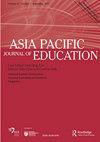‘Are we equal citizens?’: a critical discourse analysis (CDA) of language textbooks and minority faith learners’ insights in Pakistan
IF 1.7
4区 教育学
Q2 EDUCATION & EDUCATIONAL RESEARCH
引用次数: 0
Abstract
Language textbooks are discourse-led documents that contain official knowledge and construct specific learner subjectivities. Official knowledge embodies a worldview that serves the interests of dominant social group. In Pakistan, studies suggest that textbooks in general tend to distort the historical facts in favour of the national narrative. Using six language textbooks (Sindhi, Urdu, and English) taught at government-run schools in Sindh province of Pakistan, this study aims to understand how language is used to construct “Muslim identity”. Moreover, the study also considers minority faith language learners’ perspectives in order to understand their experiences and reactions. The analysis is informed by Fairclough’s (2001, 2003) writings on critical discourse analysis (CDA). The findings reveal that Muslim identity is constructed through a variety of discourses related to Islam. Furthermore, minority faith language learners perceive language learning spaces to be ideologically motivated, promoting a dominant religious identity narrative while disregarding diversity. The study recommends that the process of textbooks design should consider minority faiths to a considerable extent in the interest of inclusive and a sustainable society. The study has implications for wider global contexts, including Asia Pacific where language textbooks promote biases based on religion, gender, ethnicity, and language.“我们是平等的公民吗?”:巴基斯坦语言教科书与少数民族信仰学习者的批判性话语分析(CDA)
语文教材是话语导向的文献,包含官方知识,建构特定的学习者主体性。官方知识体现了一种为占统治地位的社会群体的利益服务的世界观。在巴基斯坦,研究表明,教科书通常倾向于歪曲历史事实,以支持国家叙事。本研究使用巴基斯坦信德省公立学校的六种语言教科书(信德语、乌尔都语和英语),旨在了解语言是如何被用来构建“穆斯林身份”的。此外,本研究还考虑了少数民族信仰语言学习者的观点,以了解他们的经历和反应。费尔克劳(2001,2003)关于批评性话语分析(CDA)的著作为这一分析提供了依据。研究结果表明,穆斯林身份是通过与伊斯兰教相关的各种话语构建的。此外,少数信仰的语言学习者认为语言学习空间受到意识形态的驱动,促进了一种占主导地位的宗教身份叙事,而忽视了多样性。该研究建议,在设计教科书的过程中,应在相当程度上考虑少数群体的信仰,以促进社会的包容性和可持续发展。这项研究对更广泛的全球背景有影响,包括亚太地区,那里的语言教科书助长了基于宗教、性别、种族和语言的偏见。
本文章由计算机程序翻译,如有差异,请以英文原文为准。
求助全文
约1分钟内获得全文
求助全文
来源期刊

Asia Pacific Journal of Education
EDUCATION & EDUCATIONAL RESEARCH-
CiteScore
4.20
自引率
5.90%
发文量
98
 求助内容:
求助内容: 应助结果提醒方式:
应助结果提醒方式:


